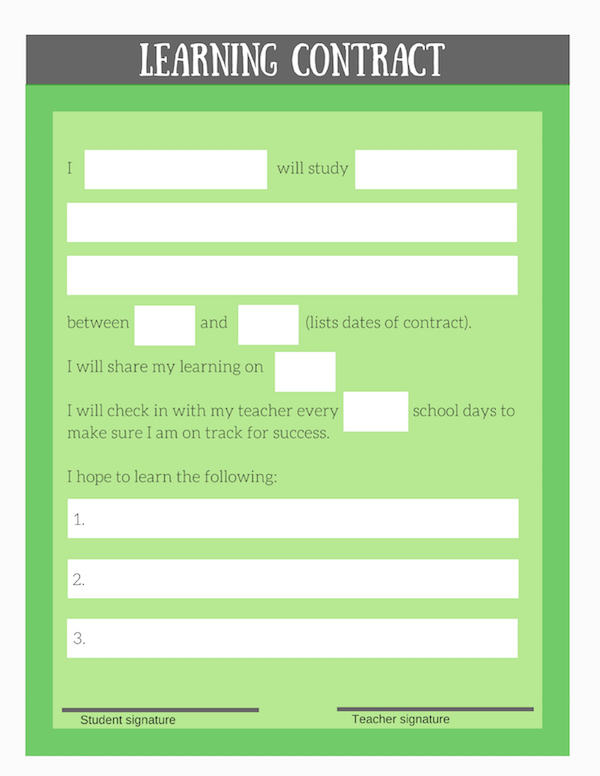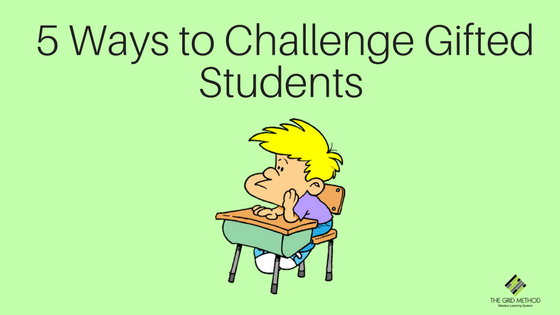We have all had those students in our class. One who knows the answer before you finish the question, one who finishes the assignment before it is handed out, and maybe another who knows how to graph quadratic functions while everyone else is trying to figure out what a function is.
Most teachers recognize that some students need a push, a challenge, or a chance to move forward in their learning. This is easier said than done. You see the problem and recognize the unique needs of gifted students, but you are unsure what the solution is.
Here are 5 ideas for challenging gifted students and advanced learners that you can implement right away in your classroom!
1. Try the Hardest Problems First
This is my favorite suggestion for math teachers! It is easy to implement, easy to monitor, and incredibly effective! Building a conceptual understanding should always be the first step in teaching math. At some point, however, students need to be able to fluently apply these concepts to problem-solving. This is usually accomplished through practice, practice, practice! You may remember being assigned questions 1-31 odds as a high school student- you needed the practice to solidify the concepts.
For the majority of students, this isn’t a bad thing. You know that endless drill and kill is not best practice, but developing fluency in problem-solving is. The problem our gifted and advanced learners have is that they simply do not need the same amount of practice to achieve the same goals.
So what is the solution? Skip most of the practice! Continue to pass out the same homework or practice activities as you normally would, but circle the two most challenging questions on the page. Offer the opportunity to skip the rest of the questions assigned if a student can answer those circled questions correctly on the first try.
If students try and are unsuccessful, review their errors with them or have them find their own errors, then circle the next two most challenging questions and offer the same deal. Watch what happens when you do this for a few weeks: Skyrocketing achievement for your gifted students!
Added bonus: Students will start to pay more attention to your instruction because they want to skip homework!
Ready for some mind-boggling news? Gifted students actually learn worse when they have to practice material they already know! Share on XLearning Contracts
I need to preface this section with, “If you don’t pre-assess your students, you are doing it wrong!”
Now that I have that off my chest, we can move on to some ideas for what to do with your pre-assessment data.
A learning contract (sometimes also referred to as an independent project) is a plan for what, how, and when a student will study a specific topic. It is best used when a student already knows a significant portion of the required content in a unit, which you will discover when you pre-assess.
These contracts can be very simple. While you do not want to leave students wandering aimlessly through content, giving them some freedom to explore ideas is powerful.

That being said, you should follow a few guidelines:
|
DO |
DO NOT |
| Give students the freedom to explore a relevant topic. | Demand that students conform to rigid rules about “thick” questions, research requirements, or strict timelines. |
| Help students find connections to the content area. If you are a science teacher working on an astronomy unit, let students explore black holes, life cycle of stars, or whether Pluto should be called a planet. | Allow students to create learning contracts for completely unrelated ideas. A chemistry student should probably not study American literature for a science learning contract. |
| Help students with time management, planning, and tracking progress. Be sure to offer loads of flexibility as their learning process progresses. | Set students completely free to manage themselves. Even adults benefit from guidance in exploring their interests. |
Curriculum Compacting
Curriculum compacting is all about getting rid of unnecessary learning. Let’s face it, many of your gifted and advanced students already know a significant amount of the content you are scheduled to teach this year. Even if they don’t know it yet, they won’t take as long to understand as other students in your class.
Ready for some mind-boggling news? Gifted students actually learn worse when they have to practice material they already know! Boredom sets in. Books start being read beneath desks. Glazed over looks in their eyes appear.
Bottom line: making gifted students relearn what they already know is ineffective.
One solution to this problem is to eliminate that wasted time! Identify what students don’t know, teach it to them quickly, and let them move on! Instead of students spending day after day not learning anything new, they get all their grade level content in a shortened time period. Then they get to move on. This lets them explore above grade level ideas. It helps them dive deep into their learning. It saves them hours and hours of wasted class time.
The tools you need to make curriculum compacting work are a high quality preassessment, a flexible approach to classroom structure, and a willingness to offer enrichment and extension activities. After that, just analyze your preassessment data and let students skip what they know!
Bottom line: making gifted students relearn what they already know is ineffective. Share on XUse Mastery Learning
Mastery learning focuses on student-paced, high accountability learning opportunities for students. When you allow your gifted students to move through content at their own pace, incredible growth can take place. Unfortunately, mastery learning can be really tricky to implement. Keeping track of all the activities different students are doing is tough. Managing the paperwork and grading is a challenge. Before you dive into mastery learning, be sure you have a plan and structure in place for making it work!
[scroll down to keep reading]Using backward design, unit planning, and pre-assessment data are excellent first steps to master learning. From that point, you should plan out the learning path that students will be on. What content comes first? How will they apply that content? How will you push towards more complex thinking? What materials do you need over the course of the unit?
Once you have those questions answered, the learning path planned, materials copied and prepared, you are ready to begin! Launch students on to that learning path. When they are ready for a formative assessment, require high performance. Only when your students can earn 80%-85% on previous standards do you allow them to move on to more challenge work.
If the idea of mastery learning feels overwhelming to you, don’t panic! Start out with some of the other suggestions on this blog and come back to the idea. There are some excellent resources you can use to make mastery learning more manageable! Check out some great tech tools to make your mastery learning life easier. Consider also using an organizational tool for planning and instruction to make the process successful.
Understand Unique Needs
Gifted and advanced students often fall into two categories: perfectionistic high achievers and underachievers (frequently labeled as scattered or lazy). They can also struggle with emotional intensity and sensitivity, multipotentiality, asynchronous development, procrastination, and self-esteem. Understanding these characteristics is key to helping create a positive learning environment.
Why is this included on a list of ways to challenge gifted learners? Because it doesn’t matter how awesomely differentiated your units and lessons are, if you do not have an understanding of what makes gifted students tick, you will struggle to help them learn.
One great source for more information on this topic is SENG (Supporting the Emotional Needs of Gifted). SENG has a slew of research articles from peer reviewed journals as well as a more traditional blog. Ian Byrd is another great source– his writing is conversational, witty and chock full of important information.
Your turn
What are some of your strategies for working with gifted students? Share your ideas with me on Twitter @TechieTeachOtt or at Tiffany@thegridmethod.com.
If you try one of these ideas out, tell me! Let me know how awesome it was so we can celebrate. Or how badly it flopped so we can figure out why and fix it!



